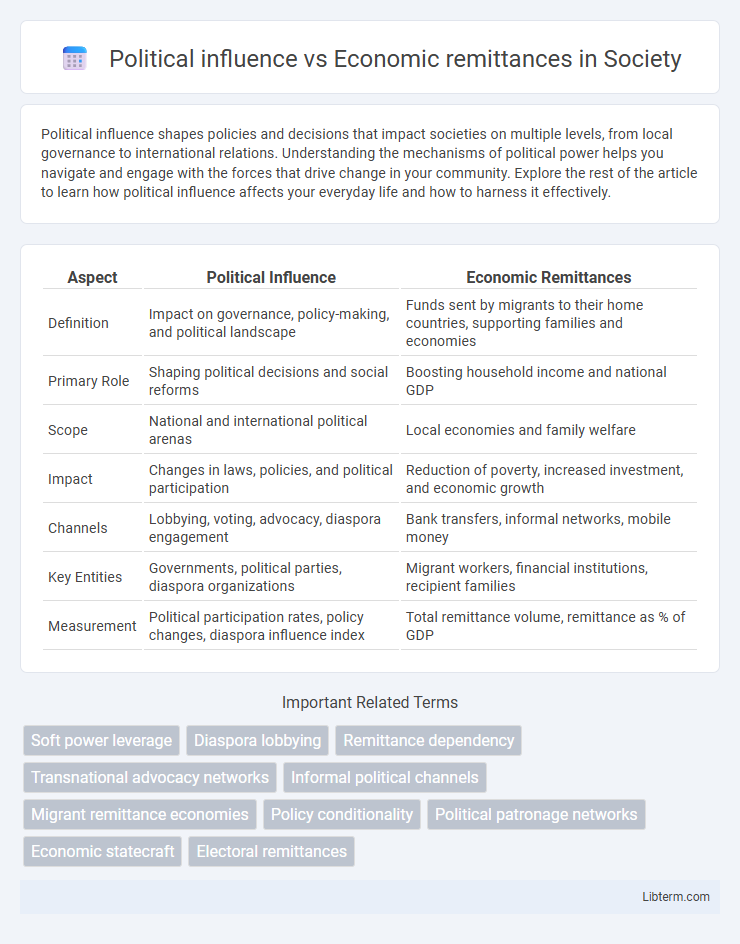Political influence shapes policies and decisions that impact societies on multiple levels, from local governance to international relations. Understanding the mechanisms of political power helps you navigate and engage with the forces that drive change in your community. Explore the rest of the article to learn how political influence affects your everyday life and how to harness it effectively.
Table of Comparison
| Aspect | Political Influence | Economic Remittances |
|---|---|---|
| Definition | Impact on governance, policy-making, and political landscape | Funds sent by migrants to their home countries, supporting families and economies |
| Primary Role | Shaping political decisions and social reforms | Boosting household income and national GDP |
| Scope | National and international political arenas | Local economies and family welfare |
| Impact | Changes in laws, policies, and political participation | Reduction of poverty, increased investment, and economic growth |
| Channels | Lobbying, voting, advocacy, diaspora engagement | Bank transfers, informal networks, mobile money |
| Key Entities | Governments, political parties, diaspora organizations | Migrant workers, financial institutions, recipient families |
| Measurement | Political participation rates, policy changes, diaspora influence index | Total remittance volume, remittance as % of GDP |
Defining Political Influence and Economic Remittances
Political influence refers to the capacity of individuals or groups to shape government policies, public decisions, and political outcomes through mechanisms such as lobbying, voting, or advocacy. Economic remittances are financial transfers sent by migrants to their home countries, significantly impacting economic development, poverty reduction, and household welfare. Understanding the distinction between political influence and economic remittances is crucial for analyzing how diaspora communities affect both governance and economic conditions in their countries of origin.
Historical Overview of Remittances and Political Power
Remittances have played a critical role in shaping political power structures throughout history, serving as a direct economic link between migrant workers and their home countries. Historically, economic remittances have influenced local governance and political stability by providing financial resources that empower families and communities, often enabling political participation and social mobility. The interplay between political influence and remittances reveals how economic dependency on migrant funds can sway electoral outcomes and policymaking in both origin and destination countries.
Channels of Political Influence in Migrant Communities
Channels of political influence in migrant communities primarily operate through transnational networks, diaspora organizations, and advocacy groups that engage in homeland politics. Economic remittances often serve as leverage in these channels by funding community projects, political campaigns, or influencing local governance in migrants' home countries. These financial flows facilitate migrants' capacity to participate in political decision-making and shape policy outcomes beyond economic contributions alone.
Economic Remittances: Scale, Sources, and Impact
Economic remittances, surpassing $700 billion annually worldwide, represent a critical financial lifeline for developing economies, primarily sourced from migrant workers in the U.S., Gulf countries, and Europe. These inflows significantly boost household incomes, reduce poverty, and stimulate local economies through increased consumption and investment in education and health. The scale and steady growth of remittances often exceed official development aid, highlighting their pivotal role in economic stability and development.
Political Influence: Mechanisms and Effects on Home Countries
Political influence operates through mechanisms such as diaspora lobbying, transnational voting, and advocacy networks that connect migrants to their home countries' political landscapes. These channels facilitate the transfer of political ideas, campaign funding, and policy preferences, often shaping governance, electoral outcomes, and democratization processes in origin states. The effects include increased political participation, enhanced accountability, and occasionally, heightened political tension or polarization depending on the alignment of migrant interests with domestic agendas.
Economic Growth Driven by Remittances
Economic remittances significantly contribute to economic growth by increasing household incomes and boosting consumption, which stimulates local markets and investment opportunities. The inflow of remittances often supports small businesses, infrastructure development, and human capital formation, creating a stable foundation for sustainable growth. Political influence, while important for policy frameworks, typically has a less direct impact on immediate economic expansion compared to the tangible financial inputs from remittances.
Comparative Case Studies: Diasporas Shaping Politics
Comparative case studies reveal how diasporas leverage economic remittances and political influence to shape homeland politics, with examples from the Indian and Palestinian diasporas demonstrating varied impacts. Indian diaspora remittances contribute significantly to economic stability while also funding political campaigns and lobbying abroad, enhancing political influence. In contrast, Palestinian diaspora efforts prioritize political advocacy and mobilization over remittances, highlighting diverse diaspora strategies in transnational political engagement.
Policy Responses to Political vs Economic Migrant Impact
Policy responses to political migrants often prioritize asylum, human rights protection, and integration support, reflecting the urgency of their displacement causes. Economic remittances from labor migrants drive development strategies, prompting policies that facilitate financial transfers, skills training, and diaspora engagement. Balancing these approaches requires targeted frameworks that address both humanitarian needs and economic contributions to optimize migrant impact.
Challenges and Controversies in Balancing Influence
Political influence through diaspora communities often clashes with the impactful flow of economic remittances, raising challenges in governance and policy formulation. Controversies emerge when remittance-dependent economies face pressure to align with the political agendas promoted by influential expatriate groups, risking sovereignty and internal stability. Balancing these dual forces requires nuanced strategies to harness economic benefits while mitigating undue political interference.
Future Prospects: Integration of Political and Economic Contributions
The future prospects for integrating political influence and economic remittances highlight the growing role of migrant communities in shaping both policy and development outcomes in their home countries. Leveraging remittances as economic capital alongside political engagement can foster more sustainable growth, enhance governance, and promote inclusive decision-making. Emerging frameworks emphasize coordinated strategies that harness financial flows and diaspora participation to address socio-economic challenges and strengthen transnational ties.
Political influence Infographic

 libterm.com
libterm.com